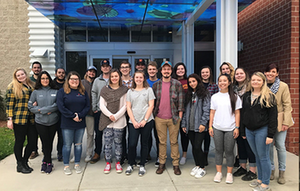
Catawba College students in the Biology Department’s parasitology class recently visited public utility Charlotte Water at its Environmental Services Facility (ESF). ESF is home to Charlotte Water’s personal water quality lab, responsible for waste water and drinking water testing within Charlotte and across multiple surrounding municipalities.
Catawba College alumnus Kyle Henderson '15 is a research scientist at Charlotte Water in the microbiology laboratory. He and other researchers routinely test the water supplies for parasites of human health importance, namely Cryptosporidium parvum and Giardia lamblia. In contaminated water supplies, these hardy parasites can cause symptoms that include diarrheic stools, fatigue and dehydration.
The students learned that researchers employ a novel high-tech and high-throughput approach to separate and visualize these parasites from other water contaminants, using magnetic beads and immunohistochemical techniques. Students were able to see first-hand the fluorescently labeled parasites that, if present, are measured and then counted to determine parasite load of the water sample.
As part of the tour, students experienced several of the high capacity analytical and organic chemistry techniques used to measure trace chemical contaminants and even organic volatiles that may be present due to by-products of microorganismal metabolism.
Overall, the students in Dr. Carmony Hartwig’s class were able to see where the intersection of concepts learned in the classroom translate into real-world techniques used by research partners in industry to ensure excellent water quality.
“Charlotte Water provided a strong correlation to the material that we have learned in the Parasitology class, while also presenting a potential field of interest," sophomore Jasmine Wiitala, a double major in Environmental Science and Biology, noted. "Before this trip, I was unaware of just how close to home these parasites really are. Without the technologies and employees at Charlotte Water and similar facilities across the planet, humans would suffer from the effects of parasites and other toxins in our drinking water, such as Giardia and Cryptosporidium.”
